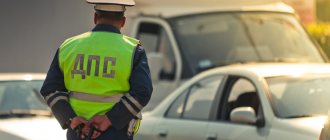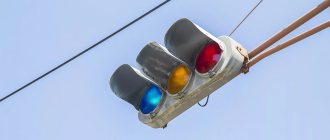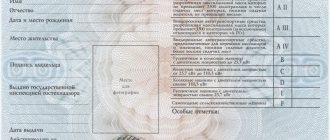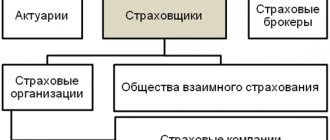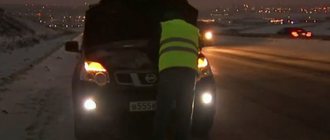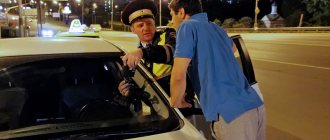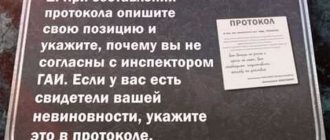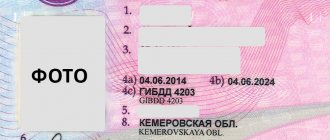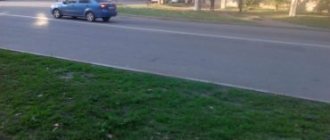Do they have the right
To answer this question, you should refer to two documents: Order of the Ministry of Internal Affairs No. 664 of August 23, 2021 and the federal law “On the Police”. These legal acts fully regulate the actions of an accident officer who stops a car.
Thus, paragraph 6.13 of the order states that the inspector has the right to use any video and audio equipment, including even special equipment that does not cause damage to human life and health, or the environment. If everything is clear with the equipment that allows you to capture the voice and what is happening, then special equipment in this case includes certified measuring instruments.
Mobile phones are not classified as special equipment, and, accordingly, they do not have to be certified.
Article 13, paragraph 33 of the Law “On the Police” also notes that a police officer has the right to use photo and video recording equipment. The 40th paragraph provides that in the absence of witnesses, the inspector can even use a mobile phone to film what is happening. Moreover, filming can be carried out both after the car stops and before. That is, we are talking about the traffic police officer recording the violation itself. This is provided for in Article 28.1 of the Administrative Code. In this case, the device on which the recording is made for later use as evidence does not matter.
Rights and responsibilities of a traffic police officer (excerpt from the Administrative Regulations)
Excerpt from the Administrative Regulations for the execution by the Ministry of Internal Affairs of the Russian Federation of the state function of exercising federal state supervision over compliance by road users with the requirements of the legislation of the Russian Federation in the field of road safety:
…6. When exercising federal state supervision, officials have the right <1>:
_______________
<1> Article 13 of the Federal Law “On the Police”.
6.1. Demand that citizens and officials stop illegal actions.
6.2. Check the identity documents of citizens if there is data giving grounds to suspect them of committing a crime or to believe that they are wanted, or if there is a reason to initiate an administrative offense case against these citizens, as well as if there are grounds for their detention in cases provided for by federal law; check from citizens and officials permits (licenses) and other documents to perform certain actions or to carry out a certain type of activity that are the subject of federal state supervision.
6.3. Summon citizens and officials to the police on pending cases of administrative offenses, as well as in connection with checking duly registered statements and reports of administrative offenses, incidents the resolution of which falls within the competence of the police; receive the necessary explanations, certificates, documents (copies thereof) regarding such cases, materials, applications and messages; to bring before the police, in cases and in the manner prescribed by federal law, citizens and officials who evade appearing when called upon without good reason.
6.4. Request and receive, free of charge, upon a reasoned request, from state and municipal bodies, public associations, organizations, officials and citizens information, certificates, documents (copies thereof), other necessary information, including personal data of citizens, except in cases where Federal law establishes a special procedure for obtaining information, in the manner determined by the Ministry of Internal Affairs of Russia and the Ministry of Health of the Russian Federation, to request and receive from medical organizations information about citizens admitted with wounds and bodily injuries of a violent nature or with wounds and bodily injuries received as a result of road traffic accidents. transport accidents <2>.
_______________
<2> Further also - “Road accident”.
6.5. Patrol settlements and public places, set up checkpoints and checkpoints, if necessary, set up posts, including stationary ones, and barriers, and use other forms of maintaining public order.
6.6. Require citizens (groups of citizens) to leave the scene of a crime, an administrative offense, the scene of an incident, if this is necessary for conducting investigative actions, operational search activities, documenting the circumstances of the commission of a crime, an administrative offense, the circumstances of an incident, to preserve traces of a crime, an administrative offense, incidents to ensure the safety of citizens; in order to protect the life, health and property of citizens, prevent them from entering certain areas of the terrain and objects or oblige them to remain in the relevant areas of the area and objects or leave them; contact groups of citizens whose presence in public places is not related to legally held public and mass events, with a demand to disperse or move to another place if the resulting crowd of citizens poses a threat to their life and health, the life and health of other citizens, and property , disrupts the work of organizations, impedes the movement of vehicles and pedestrians.
6.7. Draw up protocols on administrative offenses, collect evidence, apply measures to ensure proceedings in cases of administrative offenses, apply other measures provided for by the legislation on administrative offenses.
6.8. Deliver citizens to the office premises of a territorial body or police unit, to the premises of a municipal body, or to another office premises in order to resolve the issue of detaining a citizen; establishing the identity of a citizen if there is reason to believe that he is wanted; protecting a citizen from an immediate threat to his life and health if he is unable to take care of himself or if the danger cannot be avoided in any other way, as well as in other cases provided for by federal law.
6.9. Refer and (or) deliver citizens for medical examination to the appropriate medical organizations to determine the presence of alcohol or drugs in the body, as well as conduct examinations of these citizens for intoxication in the manner established by the Government of the Russian Federation <1>.
_______________
<1> Decree of the Government of the Russian Federation of June 26, 2008 N 475 “On approval of the Rules for examining a person who drives a vehicle for alcohol intoxication and recording its results, sending the said person for a medical examination for intoxication, medical examination of this person on the state of intoxication and registration of its results and the Rules for determining the presence of narcotic drugs or psychotropic substances in the human body when conducting a medical examination for the state of intoxication of a person driving a vehicle.”
Decree of the Government of the Russian Federation of January 23, 2015 N 37 “On approval of the Rules for referring persons who have committed administrative offenses for a medical examination for intoxication.”
6.10. Carry out, in the manner established by the legislation on administrative offenses, personal searches of citizens, searches of things on them, as well as searches of their vehicles if there is evidence that these citizens have weapons, ammunition, cartridges for weapons, explosives, devices, narcotic drugs, psychotropic substances or their precursors, or poisonous or radioactive substances, seize these items, means and substances in the absence of legal grounds for carrying or storing them.
6.11. Stop vehicles, check documents for the right to use and drive them, documents for vehicles and transported goods, the presence of an insurance policy of compulsory civil liability insurance of the vehicle owner or information printed on paper about the conclusion of a compulsory civil liability insurance contract for the owner of the vehicle in electronic form document <1>; carry out, with the participation of drivers or citizens accompanying cargo, an inspection of vehicles and cargo if they are suspected of being used for illegal purposes, with the drawing up of an appropriate act; detain vehicles that are wanted; temporarily restrict or prohibit road traffic, change the organization of traffic on certain sections of roads during public and mass events and in other cases in order to create the necessary conditions for the safe movement of vehicles and pedestrians, or if the use of vehicles threatens road safety; temporarily restrict or prohibit road traffic at railway crossings that do not comply with the rules for maintaining them in a condition safe for road traffic.
_______________
<1> Part 1 of Article 32 of the Federal Law “On compulsory insurance of civil liability of vehicle owners.”
6.12. Detain vehicles and remove drivers from driving vehicles in cases and in the manner provided for by the legislation of the Russian Federation.
6.13. Use information systems, video and audio equipment, film and photographic equipment, as well as other technical and special means that do not cause harm to the life and health of citizens, as well as the environment; maintain and use data banks of operational reference, forensic, forensic, investigative and other information about persons, objects and facts; use data banks of other government bodies and organizations, including personal data of citizens, unless otherwise provided by federal law.
6.14. Use, in urgent cases, vehicles belonging to state and municipal bodies, public associations and organizations (with the exception of vehicles belonging to diplomatic missions and consular offices of foreign states, representative offices of international organizations), and in exceptional cases - vehicles belonging to citizens, to suppress crimes, pursue persons who have committed crimes or are suspected of committing them, to deliver citizens in need of urgent medical care to medical organizations, to tow damaged vehicles from the scene of an accident, to travel to the scene of a crime, an administrative offense, to at the scene of the incident, removing, if necessary, drivers from driving these vehicles, with compensation in accordance with the procedure established by federal law at the request of vehicle owners for expenses incurred by them or material damage caused to them.
When exercising federal state supervision, officials are obliged to:
7.1. Know and comply with the Constitution of the Russian Federation, legislative and other regulatory legal acts in the field of internal affairs, and ensure their implementation.
7.2. Respect the rights and legitimate interests of citizens, public associations and organizations.
7.3. Arrive immediately at the scene of a crime, an administrative offense, the scene of an accident, stop illegal acts, eliminate threats to the safety of citizens and public safety, document the circumstances of the commission of a crime, an administrative offense, ensure the safety of traces of a crime, an administrative offense, an accident;
7.4. Provide first aid to persons affected by crimes, administrative offenses and accidents, as well as persons who are in a helpless state or in a state dangerous to their life and health, if specialized assistance cannot be received by them in a timely manner or is not available.
7.5. Identify the causes of administrative offenses in transport and traffic, as well as the conditions conducive to their commission, and take measures to eliminate them within the limits of their powers.
7.6. Ensure, within its competence, the safety of citizens and public order on the streets, squares, squares, parks, highways, train stations, airports and other public places.
7.7. In emergency situations, take urgent measures to save citizens, protect property left unattended, facilitate the uninterrupted operation of rescue services in these conditions, and participate in ensuring public order during quarantine measures during epidemics and epizootics.
7.8. To suppress administrative offenses and carry out proceedings in cases of administrative offenses referred to the jurisdiction of the police by the legislation on administrative offenses.
7.9. Participate, within the limits of their competence, in the search for persons who have committed crimes or are suspected and accused of committing them; persons who have fled from the bodies of inquiry, investigation or court, search and detention of persons who have escaped from custody, stolen or stolen vehicles.
7.10. Carry out state supervision over compliance with the requirements of regulatory legal acts in the field of road safety, regulate road traffic, draw up documents about road accidents.
7.11. Seize documents that show signs of falsification from citizens and officials, drawing up a protocol and delivering a copy of it to the specified citizens and officials.
7.12. Notify in the manner established by the legislation of the Russian Federation on combating corruption of each case of any person contacting him for the purpose of inducing him to commit a corruption offense.
Officials in the exercise of federal state supervision and performance of functions to protect the life, health, rights and freedoms of citizens of the Russian Federation, foreign citizens, stateless persons, to combat crime, protect public order, property and to ensure public safety, including road safety movement, enjoy other rights and perform other duties of police officers enshrined in the Federal Law “On Police”...
Responsibilities of traffic police officers
When a traffic police inspector stops a car and intends to resort to video recording, he is obliged to notify the driver about this. This rule is prescribed in paragraph 38 of the Administrative Regulations. Moreover, he must inform all other participants in the situation about the recording. If there are witnesses present at the scene, they must also be notified.
Even before filming begins, the employee must announce what exactly he is going to do: take photographs or make video recordings. He is also obliged to provide information about the brands and models of the funds for which the recording is made. For example, iPhone6 or Sony FDR-AX700 video camera. If the inspector silently begins filming without saying anything to the driver, he has the right to demand that he comply with the regulations of this procedure, based on the specified norm of the law.
The traffic police officer is not obliged to show the driver the video recording he made. There is no such provision in the law. However, if necessary, you can ask him about it. Often the inspector himself insists that the driver view it in order to convince him of the offense committed.
After the recording is completed, the traffic police officer must attach the video to the protocol or the certificate of examination for alcohol intoxication. It must be copied to disk and packed in an envelope with the appropriate marking.
Features of service
While on duty, a traffic police officer has certain rights, the use of which allows him to control and promptly identify or prevent offenses committed by all road users. In particular, traffic police officers have the right to stop vehicles if the person driving them commits an offense, as well as special events (to detain a criminal or in the event of an interception plan). Traffic inspectors also have the following rights:
- Require the motorist to provide documents for the vehicle (technical passport), as well as rights to drive the category of vehicles to which the stopped car belongs;
- Detain the driver until all the circumstances of a particular situation are fully clarified;
- Send the driver for a medical examination if there is reason to believe that he is under the influence of drugs or alcohol, and refusal to undergo the procedure may threaten the motorist with prosecution;
- Stop a vehicle if there is reason to believe that the vehicle has been stolen, or the person currently driving it is being sought;
- Require the provision of a vehicle in situations where it is necessary to perform a work assignment or a motorist is needed to be present as a witness to an accident, an attesting witness for the inspection of another participant in the traffic accident or the vehicle.
The main responsibilities of traffic police inspectors are regulated by regulations and establish certain frameworks of behavior when stopping vehicles, when communicating with the drivers who drove them, the procedure and rules for drawing up reports on administrative offenses. Separately, actions are also defined in situations where they suspect that the driver is intoxicated, has committed a crime, is involved in an accident or is guilty of it.
If you shoot, shoot to the end!
An important circumstance when conducting video filming by a traffic police inspector is its continuity. If an employee begins to record, then each action must be filmed to the end.
When a state traffic inspector pauses in recording or completes one recording and begins recording another file, the driver has the right to make a corresponding comment directly in the protocol. To the point of writing about it with a pen when signing the protocol.
In the future, he can appeal to this circumstance in court, insisting that the video recording be recognized as inadequate evidence. The bottom line is that if the recording shows signs of editing or is incomplete, if it does not contain any important nuances, the court cannot accept it as full-fledged evidence.
In addition, you need to remember that the driver himself has every right to film, provided that he does not interfere with the legal actions of traffic police officers.
From the above it follows that State Traffic Inspectorate employees have every reason to film a traffic incident. They can film using both special equipment and mobile phones. Car owners have the same right. Therefore, if inspectors stop you and start filming, you should take this calmly. If you want, you can start filming in response. The main thing is to be polite and confident in your rights.
What functions does the traffic police perform?
DPS is a structural unit of the State Traffic Safety Inspectorate. However, in some situations, limited to conversations and lack of documentary recording, both names imply the same structure. From a legal point of view, the concepts are not equivalent. The basic principles of the traffic police are respect for human rights, compliance with the law and consideration of elements of humanism. The structure's employees are open and public figures. Their work is based on public trust and is linked to the support of citizens. Patrol officers strive to ensure the safe and uninterrupted movement of vehicles, and also prevent crimes and offenses in the field of traffic. To carry out their official duties, they carry out activities in accordance with the regulated procedure that defines the functions of the traffic police:
- Monitoring compliance with traffic regulations;
- Traffic control;
- Assisting citizens in realizing their rights and interests;
- Proceedings of administrative offenses;
- Carrying out transport support activities;
- Implementation of urgent actions at the scene of an accident;
- Taking response measures aimed at reducing the number of accidents and drivers, passengers and pedestrians injured in them;
- Informing the population about the current road situation, the most common causes of accidents, as well as measures taken to prevent them;
- Work on the search for stolen and stolen cars;
- Search for persons who are participants in the accident and are directly related to it, but who fled the scene;
- Monitoring the external condition of the road;
- Supervision of activities aimed at restoring the road surface.
Traffic police officers have the right to take part, together with representatives of federal bodies, in carrying out preventive measures, the purpose of which is to ensure road safety. Within areas of responsibility limited by posts and patrol routes, specialists can monitor compliance with behavioral standards. Legal acts determine that the main entity authorized to carry out control and supervisory activities in the field of compliance with traffic rules is the structural unit of the traffic police of the State Traffic Inspectorate of the Ministry of Internal Affairs.
